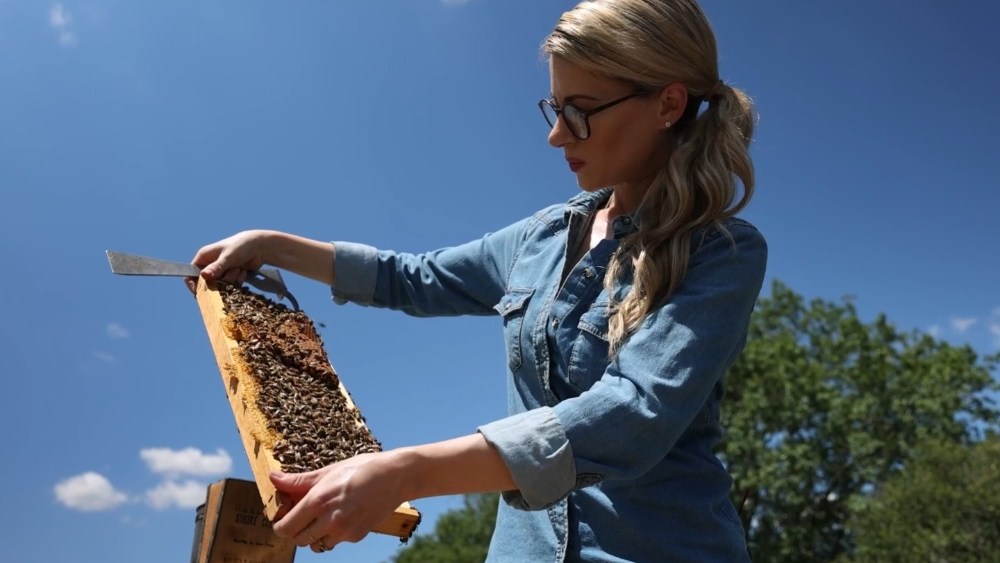Academy Award winner Angelina Jolie‘s latest venture as executive producer, the environmental documentary “Bee Wild,” made its world premiere at the inaugural SXSW London, drawing attention to the global crisis facing wild pollinators through cinematic storytelling and high-profile advocacy.
The film, narrated by Grammy-nominated artist and environmental advocate Ellie Goulding, who also contributed original music, screened at Curzon Hoxton followed by a live Q&A with award-winning directors Josh and Rebecca Tickell, producer Eva Kruse, and special guest Erika Thompson of Texas Beeworks.
“Bee Wild” represents the latest environmental project from the Tickells, whose previous documentaries “Kiss the Ground” and “Common Ground” have reached over 100 million viewers globally through streaming platforms. The husband-and-wife directing team has carved out what Josh Tickell describes as “our own little niche market” in climate-hopeful environmental documentaries.
The film features appearances by Jolie, world-renowned beekeeper Thompson, and environmental figure Professor Johan Rockström, and offers cultural and ecological insights to examine the essential role of wild bees in sustaining natural systems and food production.
During the post-screening Q&A, Rebecca Tickell emphasized the educational mission behind their work: “All of our films – we hold back rights, and we make sure that we keep educational rights, that they can be free in schools, and that’s where we’ve seen the biggest difference.”
The Tickells’ approach to environmental storytelling deliberately counters traditional “bad news cliff” documentaries. “A lot of environmental documentaries, the environmental movement itself… it’s kind of bad news cliff,” Josh Tickell explained. “That’s been the methodology that has not worked for the past 20-30 years to motivate people to make changes.”
Instead, the filmmakers infuse their work with what biophilia – love of nature – creating what Josh Tickell describes as hope-driven content that streaming algorithms struggle to categorize. “In speaking to streamers, they don’t even know how to deal with the tens of millions of viewers that our things get, because they’re like, our algorithms just aren’t designed for hope,” he said.
The documentary’s impact extends beyond entertainment, with educational testing showing remarkable results. Producer Eva Kruse recounted showing an earlier edit to a U.K. primary school class: “Half of around 25 kids broke out in tears, and they kept saying, Are we spraying with pesticides?” The screening prompted five separate parent inquiries about household pesticide use and food safety.
“Bee Wild” originally initiated by fashion and materials science company Pangaia, with the project funded through a mix of corporate contributions, high-net-worth individuals, and foundation support. The film operates under fiscal sponsorship from the Redford Center as a non-profit project.
The documentary is backed by executive producers Susan Rockefeller, Regina Scully, Anders & Anne Holch Povlsen, Melony & Adam Lewis, Peng Xiao, Mira Duma, and Melissa Moncada. The film is currently seeking distribution, with the Tickells hoping to secure streaming pathways following SXSW London.
Social media influencer Erika Thompson, who has 20 million followers across platforms, praised the film as “the most powerful film about bees of our generation” and called it “a masterpiece” that educated even experienced beekeepers like herself.
“Bee Wild” forms part of a broader global impact campaign called Bee:wild, powered by Re:wild, the nature conservation organization co-founded by Leonardo DiCaprio. The initiative aims to “Bring the Buzz Back” by encouraging pollinator-friendly practices from urban balconies to policy advocacy.
The Tickells’ previous environmental films have found success on major streaming platforms, with “Kiss the Ground” becoming one of Netflix’s most successful environmental documentaries before moving to Amazon Prime Video alongside “Common Ground.” The directing duo is currently working on their third soil-climate film, “Groundswell.”
Read the full article here


